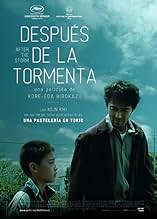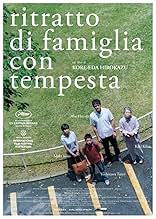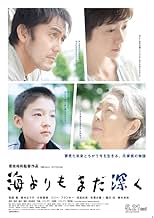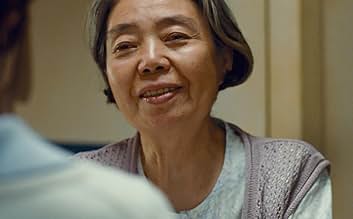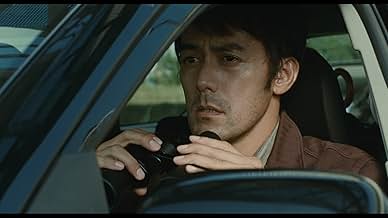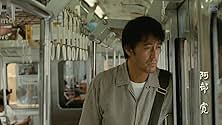NOTE IMDb
7,4/10
14 k
MA NOTE
Après la mort de son père, un détective privé a du mal à payer sa pension alimentaire et à renouer avec son fils et son ex-femme.Après la mort de son père, un détective privé a du mal à payer sa pension alimentaire et à renouer avec son fils et son ex-femme.Après la mort de son père, un détective privé a du mal à payer sa pension alimentaire et à renouer avec son fils et son ex-femme.
- Réalisation
- Scénario
- Casting principal
- Récompenses
- 2 victoires et 13 nominations au total
Avis à la une
Fear that your children may mimic your worst qualities is the driving force in Hirokazu Koreeda's ("Our Little Sister") After the Storm (Umi yori mo mada fukaku), a compassionate look at the struggles of a Japanese family. Its title derived from the lyrics of an old pop song, the film is set in Kiyose, a city near Tokyo where it is beautifully shot in the housing compound where Koreeda grew up by cinematographer Yutaka Yamasaki. Ryota Shinoda (Hiroshi Abe, "Everest: The Summit of the Gods") is a novelist who has not had a story published in fifteen years and is forced to work for a private detective agency, which he claims is solely to do research for his next novel. Using his detective job to spy on Kyoko's new boyfriend with the help of his young detective-partner (Sosuke Ikematsu, "Mubansô"), he learns that she is dating a wealthy businessman who is intrusive in Shingo's life.
A gambling addict who squanders much of his earnings, Ryota's relationship with his young son Shingo (Taiyo Yoshizawa) is in jeopardy as his ex-wife Kyoko Shiraishi (Yoko Maki, "Like Father, Like Son") threatens to keep him from seeing Shingo until he catches up on his child support payments. The first time we see Ryota we are not impressed. He is going through his recently deceased father's private belongings to see if he can find anything that he could sell. It seems, however, that his father was also a gambler and Ryota's search might have been better conducted at the local pawn shop. While it is clear that he is not a role model for parenting, Ryota is man of considerable charm and Koreeda does not stand in judgment of his actions but depicts his travails with warmth and humor. We see that in spite of his dubious habits, his sister (Satomi Kobayashi) and his employer are both willing to lend him money.
With the help of his own mother, the spunky and very astute Yoshiko (Kirin Kiki, "Our Little Sister"), Ryota has his sights set on reuniting with Kyoko and Shingo. His love for his son is very real but he seems incapable of breaking from his demons, the same ones that dominated his father's life. Attempting to win back Shingo's love, he takes him out for a hamburger, buys him new shoes, and visits Yoshiko, the boy's beloved grandmother. Knowing that a typhoon is on the way, the family comes together to spend the night and to wrestle with the direction that their lives will take. "Why can't men ever love the present," Yoshiko wonders, highlighting an important message of the film, that people must accept the reality of how they really are.
While there is truth to the idea that we must accept who we are, there is a thin line between accepting your limitations and recognizing that you have the power to transform your life, to live the life you want rather than the life you are resigned to. Also, while the idea that sons will always take after their father is accepted without question, the reality in my experience is that sons will either take after their fathers or make very sure that they do not. After the Storm is one of Koreeda's best films and, as always, he elicits exceptional performances from children as well as brilliant takes by Kiki and Hiroshi Abe, but, in my view, its message is debatable.
A gambling addict who squanders much of his earnings, Ryota's relationship with his young son Shingo (Taiyo Yoshizawa) is in jeopardy as his ex-wife Kyoko Shiraishi (Yoko Maki, "Like Father, Like Son") threatens to keep him from seeing Shingo until he catches up on his child support payments. The first time we see Ryota we are not impressed. He is going through his recently deceased father's private belongings to see if he can find anything that he could sell. It seems, however, that his father was also a gambler and Ryota's search might have been better conducted at the local pawn shop. While it is clear that he is not a role model for parenting, Ryota is man of considerable charm and Koreeda does not stand in judgment of his actions but depicts his travails with warmth and humor. We see that in spite of his dubious habits, his sister (Satomi Kobayashi) and his employer are both willing to lend him money.
With the help of his own mother, the spunky and very astute Yoshiko (Kirin Kiki, "Our Little Sister"), Ryota has his sights set on reuniting with Kyoko and Shingo. His love for his son is very real but he seems incapable of breaking from his demons, the same ones that dominated his father's life. Attempting to win back Shingo's love, he takes him out for a hamburger, buys him new shoes, and visits Yoshiko, the boy's beloved grandmother. Knowing that a typhoon is on the way, the family comes together to spend the night and to wrestle with the direction that their lives will take. "Why can't men ever love the present," Yoshiko wonders, highlighting an important message of the film, that people must accept the reality of how they really are.
While there is truth to the idea that we must accept who we are, there is a thin line between accepting your limitations and recognizing that you have the power to transform your life, to live the life you want rather than the life you are resigned to. Also, while the idea that sons will always take after their father is accepted without question, the reality in my experience is that sons will either take after their fathers or make very sure that they do not. After the Storm is one of Koreeda's best films and, as always, he elicits exceptional performances from children as well as brilliant takes by Kiki and Hiroshi Abe, but, in my view, its message is debatable.
Most films these days do not have something to 'say' anymore. They don't have a deeper meaning. And if they do, it's mostly superficial or so complex you don't really understand. 'After the Storm' by Hirokuzu Kore-eda has something to say, it's like a condensed moment of life. You will be dumbstruck by it's beauty.
The story deals with Ryota, struggling with financial problems, and trying to keep contact with his son after divorcement. He works as a private detective, spying on affairs and looking for lost cats while his real passion lies in writing literature.
The entire film is built around a central story part where they take shelter from a taifun, it involves scenes of such profound beauty, you will be moved to tears. The beauty lies in the things that are not spoken out, yet linger in the air like rain: the missed opportunities to be happy, love gone by and yet - still there.
To say the film deals with abandoned dreams in the face of reality is wrong, it's the contrary. The film says: If you keep waiting for beauty in life, you will not realize that it has already arrived. Just not the way you thought it would.
The story deals with Ryota, struggling with financial problems, and trying to keep contact with his son after divorcement. He works as a private detective, spying on affairs and looking for lost cats while his real passion lies in writing literature.
The entire film is built around a central story part where they take shelter from a taifun, it involves scenes of such profound beauty, you will be moved to tears. The beauty lies in the things that are not spoken out, yet linger in the air like rain: the missed opportunities to be happy, love gone by and yet - still there.
To say the film deals with abandoned dreams in the face of reality is wrong, it's the contrary. The film says: If you keep waiting for beauty in life, you will not realize that it has already arrived. Just not the way you thought it would.
I bet we all can find the shadow of the underachieved protagonist in ourselves, as chances are really slim in materializing one's aspirations in the cruel reality. There he is: down-and-out both in career and mariage, scraping by through blackmailing strangers, yet always managing to squeeze a complacent smile on his face when meeting his family. You would presume he is leading a hopeless, listless, even miserable life, but the means by which the Japanese director narrates the story also attached a rather warm hue to the banal life of the man. In the end, what do we know about life without living it through ourselves?
After The Storm is an absolutely brilliant film, as it deals with the trials and tribulations of a father & perceived loser in the face of challenging life circumstances. Hiroshi Abe plays the role of Shinoda Ryota, a detective that is financially broke, divorced and living in the illusion of his past glory as an award winning author. He struggles to make ends meet and often resorts to gambling, stealing and backhand deals that involves extortion in order to support himself and to pay child support for his only son, Shingo.
Another eye-catching performance to look put for is by Ryota's mom, Yoshiko, played by Kirin Kiki. She absolutely nails the role of a bewildered, lonely and regretful single grandmother, often dwelling on the unfortunate circumstances of the past and blaming her late husband for how her son turned out. She provides most of the comedic moments in the movie, as her tendency to be over-bearing and cheapskate at times, will make you giggle in the very least. She also seems obsessed and resigned to the idea that she will die alone, hence she keeps requesting her son & daughter to keep her company as much as possible. On top of that, she also harbors the faint hope that her son can be re-united with his ex-wife, and tries to set them up to sleep together during a night of storm.
Overall, the theme of After the Storm is dealing with the present circumstances in the face of unrealized dreams and broken hopes. This theme is strong in the characters of Ryota and Yoshiko. Additionally, Ryota's ex-wife, Kyoko (played by Yoko Maki) also plays an important role as she embodies the person whom manages to focus her life solely in the present times. Whilst Ryota still perceives himself as the father responsible for Shingo's journey through his current childhood phase, Kyoko has moved on and has accepted the fact that Ryota was never cut out to be a responsible father. She has even found a new boyfriend and except for the monthly visit, would rather Shingo not be spending time with his actual dad.
What really catches the eye about this movie, is that even in a fully developed country like Japan, with is high standards of living and apparent high-culture, there exists people like Ryota; someone who is left behind by the fast-moving economy and rebels against the norm of participating in the corporate rat-race to succeed career-wise. He can be pictured as someone who is very defensive whenever questioned on his life choices and habits. However, just like a starry-eyed young graduate, Ryota had dreams of his own for a stable government job, which somehow never came to be. However, the pride in him never dissolves, as the once Award-winning author still feels he deserves recognition for his past work.
Another eye-catching performance to look put for is by Ryota's mom, Yoshiko, played by Kirin Kiki. She absolutely nails the role of a bewildered, lonely and regretful single grandmother, often dwelling on the unfortunate circumstances of the past and blaming her late husband for how her son turned out. She provides most of the comedic moments in the movie, as her tendency to be over-bearing and cheapskate at times, will make you giggle in the very least. She also seems obsessed and resigned to the idea that she will die alone, hence she keeps requesting her son & daughter to keep her company as much as possible. On top of that, she also harbors the faint hope that her son can be re-united with his ex-wife, and tries to set them up to sleep together during a night of storm.
Overall, the theme of After the Storm is dealing with the present circumstances in the face of unrealized dreams and broken hopes. This theme is strong in the characters of Ryota and Yoshiko. Additionally, Ryota's ex-wife, Kyoko (played by Yoko Maki) also plays an important role as she embodies the person whom manages to focus her life solely in the present times. Whilst Ryota still perceives himself as the father responsible for Shingo's journey through his current childhood phase, Kyoko has moved on and has accepted the fact that Ryota was never cut out to be a responsible father. She has even found a new boyfriend and except for the monthly visit, would rather Shingo not be spending time with his actual dad.
What really catches the eye about this movie, is that even in a fully developed country like Japan, with is high standards of living and apparent high-culture, there exists people like Ryota; someone who is left behind by the fast-moving economy and rebels against the norm of participating in the corporate rat-race to succeed career-wise. He can be pictured as someone who is very defensive whenever questioned on his life choices and habits. However, just like a starry-eyed young graduate, Ryota had dreams of his own for a stable government job, which somehow never came to be. However, the pride in him never dissolves, as the once Award-winning author still feels he deserves recognition for his past work.
In a relatively short time span, I've seen three films by Hirokazu Kore-Eda, and I'm planning to see many more. It seems most of his work is focused on family relations, and his films are touching, heartfelt real life dramas. The raw material for Kore-Eda's films are emotions, and the ways his protagonists express them in words and by their behaviour.
Like the two other films I've seen ('Our Little Sister' and 'Like Father, Like Son'), 'After the Storm' deals with parents, children, grandchildren and siblings. In this case, the central character is a divorced writer with financial problems, who has taken a job as a private detective to make ends meet. To keep up appearances, he pretends the job is a way of doing research for a new novel, but everyone knows there is no book.
His young son is very fond of his grandma, so they go visit her. But typhoon number 24 is approaching fast, and when the writer's ex-wife comes to the apartment to pick up the boy, the bad weather conditions prevent them from going home. They have to spend the night at the grandmother's house, just as if they were a normal family. And in a way, they almost are, during that one special night. After the storm, everything has returned to normal, except that the four of them are closer than they were before. The last shot is full of symbolism: the sun shines, but several broken and abandoned umbrellas are the witnesses of the stormy night.
It takes superior film making skills to turn such a story into a good movie. The emotions have to be measured out with care, in order to prevent it from turning into a tearjerker. The dialogue has to be natural, but at the same time not superficial. And the actors have to be completely believable. Just leave it to Kore-Eda: every scene is a joy to watch. It's those little things that make his characters so real: when his mother starts pleading him to stay the night, the writer says: oh, mother, please don't use this voice like you're almost dying. These are exactly the things mothers and sons say to each other, with a mix of affection and irritation.
The director also gives little hints and references which you only fully understand after a while. At the very beginning, the writer's mother remarks that a neighbour has moved to a bigger house. Only much later we learn that this has always been her own dream, and that she's tired of her own tiny apartment. I think it takes a second viewing to get all the tiny hints sprinkled throughout the story.
Are we what we hoped to be? And what was it exactly we hoped to be? Those are the questions 'After the Storm' deals with. There are no clear cut answers. But thinking about the questions makes this film worthwhile.
Like the two other films I've seen ('Our Little Sister' and 'Like Father, Like Son'), 'After the Storm' deals with parents, children, grandchildren and siblings. In this case, the central character is a divorced writer with financial problems, who has taken a job as a private detective to make ends meet. To keep up appearances, he pretends the job is a way of doing research for a new novel, but everyone knows there is no book.
His young son is very fond of his grandma, so they go visit her. But typhoon number 24 is approaching fast, and when the writer's ex-wife comes to the apartment to pick up the boy, the bad weather conditions prevent them from going home. They have to spend the night at the grandmother's house, just as if they were a normal family. And in a way, they almost are, during that one special night. After the storm, everything has returned to normal, except that the four of them are closer than they were before. The last shot is full of symbolism: the sun shines, but several broken and abandoned umbrellas are the witnesses of the stormy night.
It takes superior film making skills to turn such a story into a good movie. The emotions have to be measured out with care, in order to prevent it from turning into a tearjerker. The dialogue has to be natural, but at the same time not superficial. And the actors have to be completely believable. Just leave it to Kore-Eda: every scene is a joy to watch. It's those little things that make his characters so real: when his mother starts pleading him to stay the night, the writer says: oh, mother, please don't use this voice like you're almost dying. These are exactly the things mothers and sons say to each other, with a mix of affection and irritation.
The director also gives little hints and references which you only fully understand after a while. At the very beginning, the writer's mother remarks that a neighbour has moved to a bigger house. Only much later we learn that this has always been her own dream, and that she's tired of her own tiny apartment. I think it takes a second viewing to get all the tiny hints sprinkled throughout the story.
Are we what we hoped to be? And what was it exactly we hoped to be? Those are the questions 'After the Storm' deals with. There are no clear cut answers. But thinking about the questions makes this film worthwhile.
Le saviez-vous
- AnecdotesAlbeit released later, this film wrapped earlier than Koreeda's previous film Notre petite soeur (2015). The month-and-a-half filming of After the Storm took place starting in May 2014 in between the production of Our Little Sister, which was shot throughout a year.
- Citations
Shinoda Yoshiko: I wonder why it is that men can't love the present. Either they just keep chasing whatever it is they've lost... or they keep dreaming beyond their reach.
- ConnexionsReferences Mon voisin Totoro (1988)
- Bandes originalesShinkokyû
Music and lyrics by Takashi Nagazumi
Performed by Hanaregumi
Courtesy of Victor Records and Speedstar Records
Meilleurs choix
Connectez-vous pour évaluer et suivre la liste de favoris afin de recevoir des recommandations personnalisées
- How long is After the Storm?Alimenté par Alexa
Détails
- Date de sortie
- Pays d’origine
- Site officiel
- Langue
- Aussi connu sous le nom de
- After the Storm
- Lieux de tournage
- Kiyose, Tokyo, Japon(Train station)
- Sociétés de production
- Voir plus de crédits d'entreprise sur IMDbPro
Box-office
- Montant brut aux États-Unis et au Canada
- 272 132 $US
- Week-end de sortie aux États-Unis et au Canada
- 27 880 $US
- 19 mars 2017
- Montant brut mondial
- 5 382 886 $US
- Durée1 heure 58 minutes
- Couleur
- Mixage
- Rapport de forme
- 1.85 : 1
Contribuer à cette page
Suggérer une modification ou ajouter du contenu manquant

Lacune principale
By what name was Après la tempête (2016) officially released in India in Hindi?
Répondre

